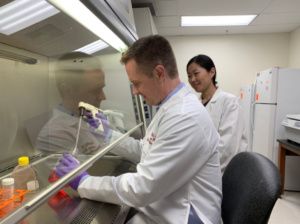USC Norris Comprehensive Cancer Center
An NCI-designated Comprehensive Cancer Center
Recent Posts
- Swing Against Cancer 2025
- New grant funds first-of-its-kind gene therapy to treat aggressive brain cancer
- Study links PFAS contamination of drinking water to a range of rare cancers
- USC study explores new insights into innate resistance for immunotherapies in colorectal cancer
- An early blood test can predict survival in patients with metastatic prostate cancer, shows USC study
PHASE ONE Foundation has awarded Dr. Kevin Kelly at the USC Norris Comprehensive Cancer Center $150,000 to fund a phase 2 study investigating the efficacy of a novel combination of drugs to treat relapsed and refractory multiple myeloma
Originally posted on PHASE ONE Foundation News
October 13, 2022
 Multiple myeloma is the second most common hematologic malignancy. It is a type of blood cancer that targets plasma cells, causing them to multiply unchecked, taking over space in the bone marrow of those affected, and producing excessive harmful proteins. Multiple myeloma causes many secondary problems, including anemia, severe bone pain, and an inability to fight infection. The average life expectancy after diagnosis is three to five years, and 12,000 individuals lose their lives to it each year. It is seen most commonly in African American populations, and Hispanic patients have the lowest survival rate.
Multiple myeloma is the second most common hematologic malignancy. It is a type of blood cancer that targets plasma cells, causing them to multiply unchecked, taking over space in the bone marrow of those affected, and producing excessive harmful proteins. Multiple myeloma causes many secondary problems, including anemia, severe bone pain, and an inability to fight infection. The average life expectancy after diagnosis is three to five years, and 12,000 individuals lose their lives to it each year. It is seen most commonly in African American populations, and Hispanic patients have the lowest survival rate.
Multiple myeloma is considered incurable at present. There are many available therapies at initial diagnosis, but most patients experience relapse at one to three years. Treatment after relapse requires combination therapy to enhance the body’s antitumor immune response. Dr. Kelly and his team have previously combined Pelareorep (Pela) and Bortezomib (Bz) in a trial with a remarkable 55% response rate, significantly more successful than other available rescue therapies.
“We are very excited to take our novel immunotherapy approach targeting multiple myeloma to the next phase of development,” said Dr. Kelly, member of the USC Norris Translational and Clinical Sciences Program and Associate Professor of Clinical Medicine at the Keck School of Medicine. “Our approach of combining an oncolytic virus and an immune checkpoint therapy seeks to harness the potential of the immune system for optimal disease control.”
In the current trial, Dr. Kelly will expand to add Pembrolizumab (Keytruda®), a PD-1 immune checkpoint inhibitor, to allow and enhance the anti-tumor immune response of Pela and Bz. Pela has dramatic PD-L1 immune priming effects (by increasing cell expression of PD-L1) that make it an optimally precise agent to sensitize multiple myeloma cells to immune checkpoint inhibitor therapy. In the lab, this drug combination demonstrated a significant decrease in disease burden and increased overall survival.
“We are very grateful to the PHASE ONE Foundation for their support which will bring new treatments to the clinic and renewed hope to patients,” said Caryn Lerman PhD, Director of the USC Norris Comprehensive Cancer Center, H. Leslie and Elaine S. Hoffman Chair in Cancer Research, and Associate Dean for cancer programs in the Keck School of Medicine of USC. “These scientific discoveries would not be possible without philanthropic partners such as the PHASE ONE Foundation.”
This trial will establish the safety and efficacy of this specific combination of medications in patients with recurrent multiple myeloma. It will also evaluate predictive biomarkers of treatment success to aid future trials in this realm. PHASE ONE will support the operations aspect of this innovative and necessary clinical trial, ultimately accelerating the development of a new combination therapy to treat multiple myeloma. Mieke Neumann, Co-Chair of the Granting Committee for PHASE ONE Foundation, remarked, “Dr. Kelly’s innovative use of drugs and immunotherapy gives those who have been diagnosed with multiple myeloma and those who love them new hope!”
